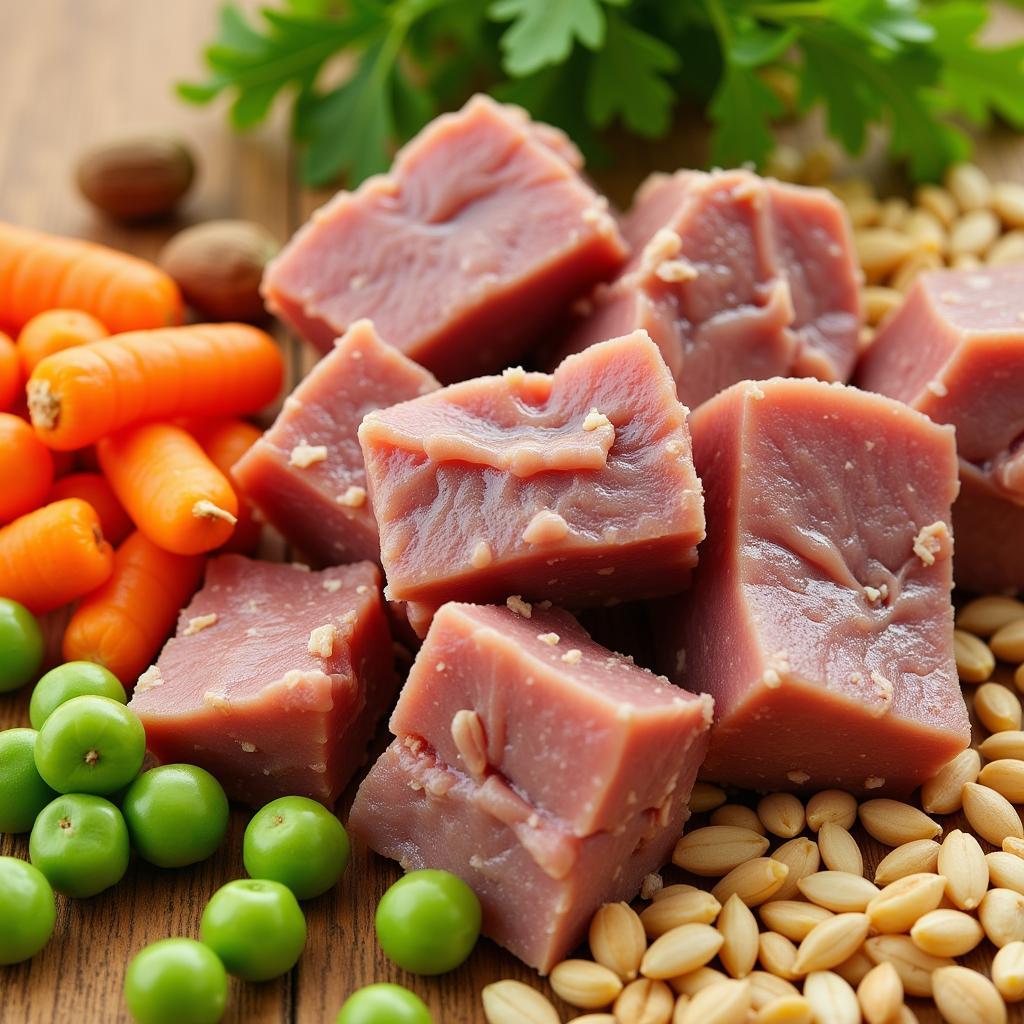Rabbit Flavored Dog Food has recently gained popularity amongst pet owners. But is this novel protein source truly beneficial for our canine companions, or is it simply another trend in the ever-evolving pet food industry? This article dives deep into the world of rabbit-based dog food, exploring its potential benefits, drawbacks, and everything you need to know to make an informed decision for your furry friend.
Understanding the Appeal of Rabbit in Dog Food
Rabbit meat is a novel protein, meaning it’s less commonly used in commercial dog foods compared to chicken, beef, or lamb. This makes it a potentially attractive option for dogs with food sensitivities or allergies to more common protein sources. Rabbit is also a lean protein source, packed with essential nutrients like B vitamins, phosphorus, and potassium, while being relatively low in fat and cholesterol. This nutritional profile can be particularly beneficial for dogs requiring a weight management diet or those with sensitive digestive systems.
Could rabbit be the key to a healthier, happier pup? For some dogs, absolutely. But it’s important to understand the nuances of this protein source before making the switch.
 Rabbit Dog Food Benefits
Rabbit Dog Food Benefits
Is Rabbit Dog Food Right for Your Dog?
While rabbit offers several advantages, it’s crucial to consider your individual dog’s needs. Puppies, adult dogs, and senior dogs all have different nutritional requirements. If your dog suffers from rabbit dog food allergies, rabbit is obviously not a suitable choice. Always consult with your veterinarian before making any significant changes to your dog’s diet, especially if they have pre-existing health conditions.
What are the benefits of rabbit flavored dog food?
Rabbit provides a lean protein source that’s easily digestible and rich in essential nutrients. It’s a novel protein, which can be helpful for dogs with allergies.
What are the potential drawbacks?
Rabbit can be more expensive than other protein sources. Not all dog food brands offer rabbit-based formulas. Some dogs may simply not enjoy the taste.
 Rabbit Dog Food Ingredients
Rabbit Dog Food Ingredients
Choosing the Best Rabbit Flavored Dog Food
The pet food market is flooded with various brands and formulas, making it challenging to select the right one. Look for high-quality ingredients, avoiding artificial colors, flavors, and preservatives. The first ingredient should ideally be rabbit, indicating it’s the primary protein source. Consider your dog’s age, size, activity level, and any specific dietary needs. Reading online reviews and consulting with your veterinarian can help you narrow down your choices.
Dr. Emily Carter, a veterinary nutritionist with over 15 years of experience, emphasizes, “Rabbit can be a fantastic option for dogs with sensitivities, but quality is key. Look for brands that prioritize whole ingredients and transparent sourcing.”
Making the Transition to Rabbit Dog Food
Switching your dog’s food abruptly can lead to digestive upset. Introduce the new food gradually, mixing it with their current food over a period of 7-10 days. Start with a small amount of rabbit-based food and slowly increase the proportion while decreasing the old food. Monitor your dog for any signs of digestive issues, such as vomiting or diarrhea.
How do I transition my dog to rabbit dog food?
Gradually introduce the new food over 7-10 days, mixing it with their current food. Start with a small amount and slowly increase the proportion.
Conclusion
Rabbit flavored dog food presents a compelling alternative to traditional protein sources. Its lean profile, rich nutrient content, and novel protein status make it a potentially beneficial option for many dogs. However, careful consideration of your dog’s individual needs and a gradual transition are crucial for success. By understanding the advantages and drawbacks of rabbit-based diets, you can make an informed choice that supports your dog’s overall health and well-being. Remember to consult your veterinarian for personalized advice.
FAQ
- Is rabbit dog food hypoallergenic? While rabbit is a novel protein, it’s not guaranteed to be hypoallergenic for all dogs.
- Is rabbit dog food good for sensitive stomachs? Rabbit is a lean and easily digestible protein, making it potentially suitable for dogs with sensitive stomachs.
- Where can I buy rabbit flavored dog food? Specialty pet stores and online retailers often carry rabbit-based dog food formulas.
- Is rabbit dog food more expensive than other types? Rabbit can be more expensive than more common protein sources like chicken or beef.
- Can puppies eat rabbit dog food? Yes, but ensure the formula is specifically designed for puppies and their nutritional requirements.
- Is rabbit dog food good for weight loss? Rabbit’s lean protein content can make it a helpful component in a weight management diet for dogs.
- How do I know if my dog is allergic to rabbit? Consult with your veterinarian if you suspect a food allergy. They can perform tests to determine the cause.
If you suspect your dog might have allergies, check our article on rabbit dog food allergies.
For further information on dog nutrition and dietary needs, please explore other helpful articles on our website.
Need support? Contact us 24/7: Phone: 02437655121, Email: minacones@gmail.com or visit us at 3PGH+8R9, ĐT70A, thôn Trung, Bắc Từ Liêm, Hà Nội, Việt Nam.